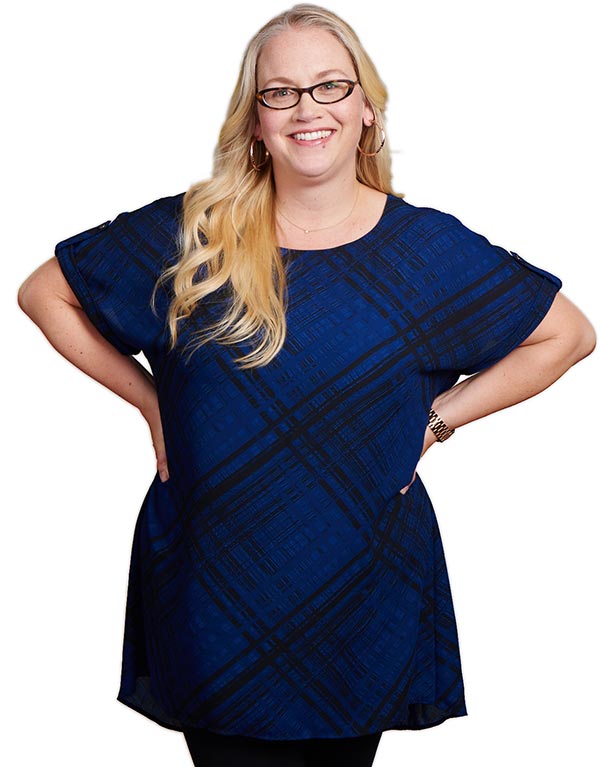 Today, part 2 of the condensed Chapter 1 excerpt from my new book, Food: The Good Girl’s Drug. (Tomorrow’s installment: Are all bingers overweight?)
Today, part 2 of the condensed Chapter 1 excerpt from my new book, Food: The Good Girl’s Drug. (Tomorrow’s installment: Are all bingers overweight?)
There are literally millions of us out there who have struggled with emotional overeating and bingeing. It’s estimated that three-and-a-half percent of women and two percent of men in the United States have full-blown binge eating disorder. (And that doesn’t even count the people who don’t meet those criteria and who binge eat more occasionally or use other disordered behaviors!) Recent research has shown that binge eating is more common than anorexia and bulimia combined, and that kids as young as six years old can have problems with it. But bingeing isn’t talked about as much as anorexia and bulimia, and that means there aren’t nearly enough resources for those who need help, said Jennifer Nardozzi, Psy.D., national training manager for the Renfrew Center Foundation.
I’ve often wondered why the discussion of binge eating is so much more muted than other disorders. It could be because it’s simply not as—for lack of a better word—“glamorous” as the diseases that make people skinny. Just think about it: Tabloid covers explode with exclamation points and praise when a pop star “gets her bikini body back” and some of our most celebrated young female celebs are so skinny they look a little sick. Writers and bloggers titter about how stars look anorexic, but then go on to talk about how fashionable and cool they are. “There’s still a negative stigma attached to overeating,” said Charles Sophy, F.A.C.N.., a psychiatrist in Beverly Hills who treats many young women with disordered eating, including some in the entertainment industry. “This is especially true for women, where it is oftentimes viewed as being unfeminine. But being skinny, even too skinny, can be associated with determination or what someone may have to sacrifice in order to pursue a certain career path. Those superskinny people seem to have it all together, while being overweight can be associated with what people think of as a lack of discipline or laziness, and a general lack of control. Many times that’s untrue—just like the idea that skinny people have it all together.”
Still, the message we girls and women get is all too clear: Being skinny—even if you have to starve or throw up to get that way—is pretty and glamorous; eating too much and getting fat is ugly and unacceptable. Just ask twenty-year-old Amanda, who used to starve herself and even illegally bought ADHD meds from a guy in her dorm in order to suppress her appetite and slim down: “My freshman year of college, I started taking Adderall to curb my appetite, and I wouldn’t eat for days. But I wasn’t even worried about it. I just wanted to look good,” she told me. “The only time I would eat would be when I didn’t take a pill, and then I would binge on huge amounts of food. I knew something was wrong, but the sad thing is that I wasn’t ashamed of my disordered eating habits until I started gaining weight. I liked not eating and how I looked; it was only when I started eating too much that I became ashamed and upset with myself.”
More to come tomorrow. In the meantime, have you ever felt like the problem of emotional eating or binge eating has been ignored—either by media, or by doctors or therapists? Maybe even your parents or other loved ones? Why do you think that is? xo…Sunny
[photo: Marcin Wichary]


![Have You Ever Choosen Food Over People? [HealthyGirl.org BookClub]](../../../../wp-content/uploads/2011/01/book_3d-205x300.png)
![How Do <i>You</i> Describe Your Issues With Food? [HealthyGirl BookClub]](../../../../wp-content/uploads/2011/05/715890075_16dc54bc9f-300x199.jpg)
![What Exactly Counts as a Binge—And Are All Bingers "Overweight"? [book excerpt]](../../../../wp-content/uploads/2011/04/1381800206_0f4fd70f56-300x225.jpg)
![Would Someone Please Explain Why I Can't Stop Eating? [book excerpt]](../../../../wp-content/uploads/2011/04/MARTINI-222x300.jpg)
[…] is a VERY powerful concept. HealthyGirl’s “Why Don’t More People Talk About Binge Eating?” post yesterday reminded me of a lot of the reasons I want to battle shame, especially as […]
I think it just depends on your perspective. I’m in recovery from bulimia, but when I was practicing my disorder, I always felt a TON of shame + stigma, and it seemed to me that the only “socially acceptable” ED was anorexia.
For me, I felt that it was MY problem and that I should deal with it silently and I felt ashamed because I knew that no one around me could truly understand how I feel about my disorder. I also believe that disordered eating is almost accepted as long as it doesn’t get you fat. Which frickin sucks! There are so many people suffering and it’s not fair to keep binge eating and other eating disordered behavior in secret will make it go to go away.
I would love to get your blog through google reader, do you have a feed available?? Love your site and the work you are doing.
Hi Rachel, yes! My web designer just set one up. Here’s the link to subscribe: http://feeds.feedburner.com/healthygirl/VdIE
I think another reason why people don’t talk about binge eating disorder as often is because a lot of people don’t understand the psychological connection between depression and compulsive eating. In books and movies, girls and guys who are depressed or sad tend to lose their appetites rather than feel compelled to eat everything in sight. Since most people associate eating disorders with wanting to lose weight, compulsive eating doesn’t seem “real” to people. I never thought I had an eating disorder until now: I thought I was just weak and destined to be overweight and unhappy with my body image. It’s really up to professionals and people who deal with overeating disorders to help get the word out so that people understand that there is a REAL psychological connection to compulsive eating, just like any other compulsive behavior, like overwashing hands, skin picking, and nail biting.
I had two doctors and a psychologist dismiss my binge eating disorder , since I was thinner than average they couldn’t believe that I wasn’t bulimic or that I had bed .
Hi Sarah,
Doctors being misinformed and under-informed about binge eating (and eating disorders in general) is a huge problem. I’m so sorry that happened, but so glad you brought it up. I’m planning on writing a piece about that very topic for the Huffington Post next week. I will send you the link when it’s up. xo…Sunny
I had the same issue, Sarah. When I finally got up the courage, (after a few years of struggling) to talk to my doctor and admit I thought I had bulimia, or an EDNOS, her immediate response was, “but you’re so thin, you don’t look like you have a problem.” It took me two more years to get up enough courage to seek treatment again. Now that I have and am much healthier, I still have an inclination to write that first doctor and tell her how her comment made me feel.
Keep up the great work, Sunny.
[…] posted to healthygirl.org on April […]
[…] want to—hey, that’s OK), you can read most of the first chapter in these excerpts here, here and here. Just to recap, each Friday for the next several weeks, I’m going to choose one […]